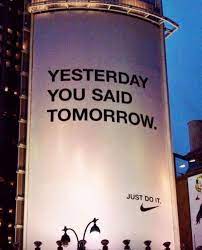Do you procrastinate? I know I do it more often than I would like to admit. We all have a tendency to procrastinate.
Very recently, I saw this photo in a LinkedIn post.
To be legally clear, this is a billboard type advertisement by Nike. They are very famous for their "Just Do It" slogan. Now they have two and they have combined both into an even more powerful expression.
The definition of "procrastinate" from the Oxford dictionary is: "to delay or postpone action; put off doing something." It is like the old colloquialism "Manana." Mañana is tomorrow in Spanish. We all do it to one degree or another.
From a business perspective, to procrastinate is a terrible situation if you or a great many people in a company or organization do it. If it occurs too often or too much, then what does it do: it has the probability to DELAY MOST EVERYTHING. Is that what you really want? No, I doubt it. It very well may hurt you, your colleagues, your company and your organization through lower revenues, lower profit, delayed shipments, etc., etc.
One survey said that 15-20% of adults regularly procrastinate. In one study, it was reported that 88% of those surveyed said they procrastinate for at least 1 hour daily. In a typical company of about 300 people, let's figure out the lost time attributable to procrastination. 300 people (x) 1 Hour (x) 5 days a week (x) 48 (allowing for vacation time and holidays) (x) .88 (procrastination % from study) equals 63,360 hours lost annually because of procrastination. Can you and your company afford that? No, that's what I thought.
Even as a semi-retired person I try my very best to have a daily list of actions I need to deal with on a given day. What I do not do often enough is prioritize them. If I did, I believe my level of procrastination would drop significantly, Typically most people will likely procrastinate on that most important one. The one they should do their best to "Just Do It."
So when you make a commitment, 'JUST DO IT."
When you decide this is something you want or need to do, "JUST DO IT."
Bob Jacobson October 19, 2022


Comments
Post a Comment